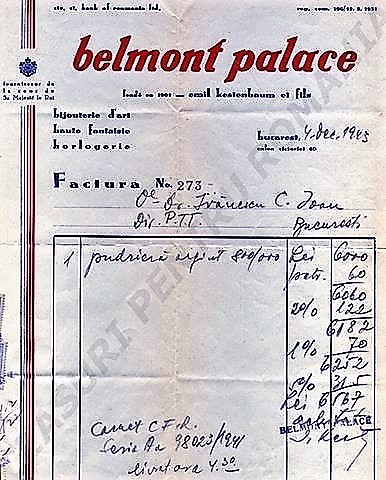
Jews filled many important roles in the Romanian economy, thanks to their financial and commercial skills, and especially because of their many political ties, primarily with the Ottoman Empire, but also with neighboring countries, including Poland, Hungary andthe Habsburg Empire.
The first Jews to settle in Walachia and Moldova were merchants and craftsmen who came from Poland in the 16th and 17th centuries. Encouraged by wealthy owners of estates who invited them from other countries, they established trading and craft towns called "Târg" (in Romanian "fair" or"market') on their lands and set up trade centers, inns, flour mills and craftwork shops in Moldova. Jewish merchants founded fairs that helped to increase foreign trade, especially in the export of wheat, animal hides and cattle.
Sephardic Jewsf rom Constantinople, especially merchants and moneylenders, played an important role in the economic life of Romania's principalities, and as they settled there they continued todevelop trade relations and provide loans to Romanian rulers. In many cases they received land from therulers in return for their services.
In the late 19th century, the distribution of Jewish occupations was no different from that of the general population. In general, as far as Jewish professions were concerned, traditional Jewish trades, such as tailors, shoemakers, furriers and silversmiths, could be distinguished from professions related to the economic development at the time, such as building construction and industry. Jews were active in trade at all levels: street vendors, second-hand merchants, market stalls, as well as modern clothing stores. Jews also developed new methods of commerce, such as distribution agencies. They were also involved in the financial field, and in 1874 founded one of the most important banks in Romania, the Marmorosch-Blank Bank. Jews also worked in various industries, built many factories and reached impressive achievements. In some of the agricultural industries, including the wine industry, the Jews had a considerable influence.
Romania experienced a period of economic growth between the two worldwars, culminating in 1938. Socio-economic development was largely influenced by the fact that, following the historic reunification of Greater Romania from 1918, its population and territory doubled. It was a period of liberalization in economic policy and of industrial development and modernization, and Jews helped to make important contributions. Many Jews invested in the industrial plants in the Regat (the Old Kingdom), and in the territories which had been annexed to Romania. They invested in industrial enterprises, engaged in banking that encouraged investment, and in 1937 over thirty percent of the industrial enterprises were Jewish owned.
After Hitler's rise to power, an anti-Jewish trend in Romania grew. The Nazi regime influenced most parties, and in 1934 anti-Jewish discrimination laws were legislated in the areas of commerce and industry.